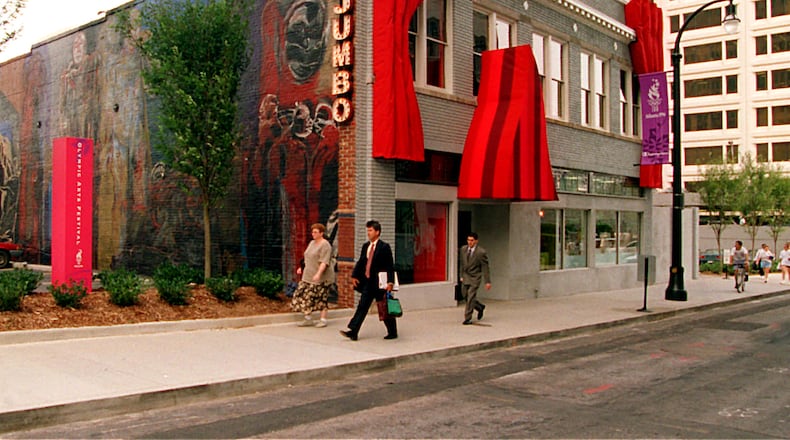In 1992, Anne Quatrano was at a crossroads. She and her husband, Clifford Harrison, had lost their jobs in Long Island and were considering starting over in a new place.
Harrison pointed out that Atlanta had been awarded the 1996 Olympic Games, and Quatrano’s mother happened to own a piece of property in Cartersville.
The couple packed up with their sights set southward, looking forward to the opportunities that a new city, particularly one that would soon have an international spotlight on it, could provide.
Nearly 30 years later, Quatrano and Harrison own some of Atlanta’s most lauded restaurants, including Bacchanalia, which opened just before the Olympics.
They were among the many culinary talents drawn to the city because of the Games who ended up staying, making an indelible mark on Atlanta’s dining landscape.
“The buildup was all about what a great city it is,” Quatrano said. “It brought a lot of recognition around the country of the restaurants that were here and what they were doing.”
Credit: CHARLOTTE B. TEAGLE
Credit: CHARLOTTE B. TEAGLE
An explosion of growth
The buildup to the Olympics prompted a flurry of restaurant openings. Planet Hollywood and Hard Rock Cafe made their downtown Atlanta debuts, while chains like Morton’s and Ruth’s Chris Steakhouse added locations.
Buckhead added new watering holes like Sloppy Joe’s, California Cafe and Dick’s Last Stand. Buford Highway saw openings of mainstays including Canton House and BBQ Corner II. Immigrants such as Michelle Liu, who ran La Mei Zi with her sister Karen Wang for several years, moved to Atlanta in 1993, seeing opportunity with the coming of the Olympics.
This period saw the debut of some of the city’s top fine-dining culinary talent. Besides Bacchanalia, Canoe, Mumbo Jumbo and Nava also opened their doors in time for the Olympics.
While many eateries reported record sales at the time, not every restaurant owner reaped the benefits of having the Games in the city. Downtown landmark Thelma’s Country Kitchen was displaced from its original location to make way for what is now Centennial Olympic Park (the restaurant was relocated and later closed).
Some businesses reported their regular Atlanta customers stayed away over traffic fears, while suburban restaurants that didn’t have Olympic venues nearby saw dramatic declines.
Donald Ratajczak, economic forecaster at Georgia State University, said in 1996 that the Games had a total economic impact over the years leading up to the Olympics of about $4 billion — more than $1 billion less than others had projected for the state.
Getting ready
Peasant Restaurants LLC, which owned about 14 metro locations of Peasant and Mick’s Restaurants and City Grill at the time, started preparing for the influx of crowds to the area about two years before the Olympic torch was lit.
Karen Bremer, who served as the group’s regional operations manager and is now the CEO of the Georgia Restaurant Association, said the unprecedented influx of crowds during the Games pushed even the most seasoned hospitality veteran to get creative.
The company hired people whose sole job was to roll silverware and do “side work” like slicing lemons and preparing coffee, since servers would be too busy during their shifts. They also identified which restaurants they thought would be the least likely to get foot traffic and opened them up for group sales.
Employees were going nonstop, she said, so the restaurant gave each person a free day off along with two tickets to an Olympic event to ease the burden.
“The intensity of it was overwhelming to a lot of people,” she said. “It wasn’t going to be like a regular lunch shift where you’re busy from 11:30 to 1:30. Things would pick up around 1, and then it was nonstop until midnight or 1. But it was also very exciting. It was once in a lifetime.”
Gerry Klaskala, who opened Canoe in 1995, said the restaurant identified which staff members spoke languages other than English so they could be tapped to communicate with international clientele.
Lasting impact
Hosting a major international event like the Olympics put Atlanta on the culinary map in ways that can still be seen 25 years later.
“It changed the expectation for a desire for a certain level of service,” said Kris Reinhard, a partner at Fifth Group Restaurants, who moved to the city in 1995 and helped prepare restaurants like South City Kitchen for the Games. “It put Atlanta on a higher level on the map of dining destinations.”
The spotlight on the city also put more of a national focus on Southern food and preparation that only grew after the Olympics, Quatrano said.
“I wouldn’t say there was a national affection for Southern cuisine until after (the Games),” she said.
Klaskala said the Olympics can also be credited, in part, for the proliferation of chef-owned restaurants in the city. Atlanta’s place on the world stage “was a natural extension of people wanting to express themselves,” he said.
Read more stories like this by liking Atlanta Restaurant Scene on Facebook, following @ATLDiningNews on Twitter and @ajcdining on Instagram.
About the Author
The Latest
Featured



